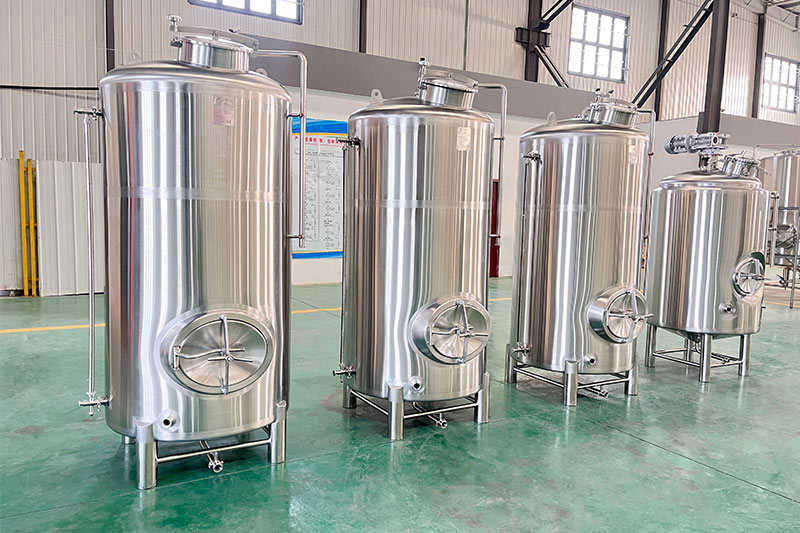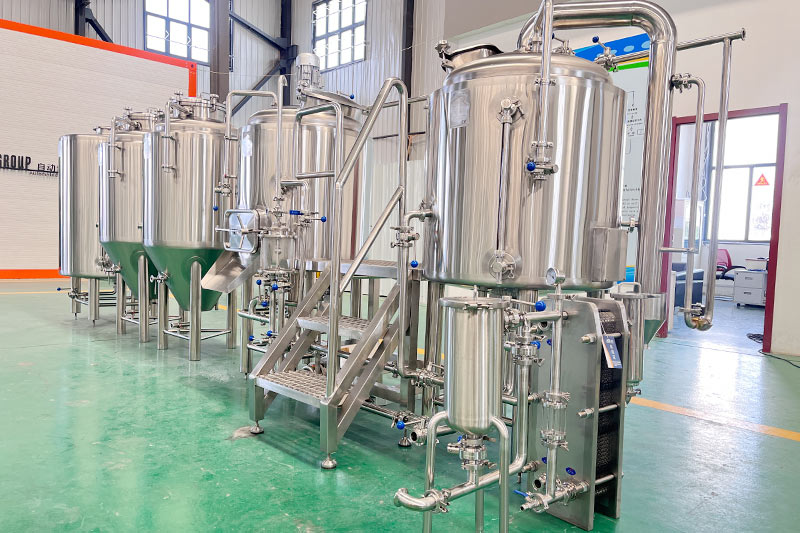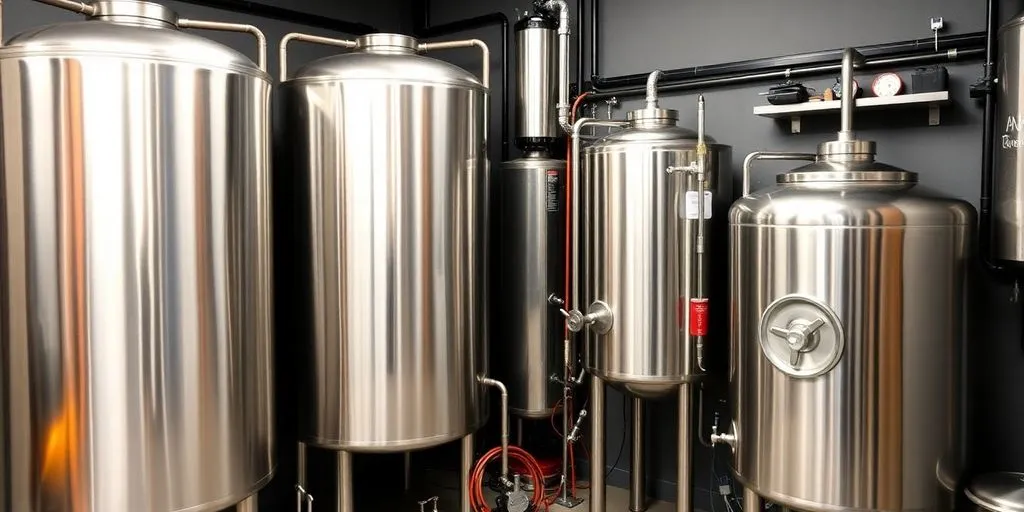Unlock the secrets of professional brewing with mini brewery equipment designed for aspiring brewers and small establishments. Learn how you can brew your own beer with top-notch brewing equipment, and discover why investing in the right tools is essential for quality and consistency. This guide will walk you through everything you need to know about setting up a home brewery or a small brewery, transforming your passion into a delightful reality.

Why Choose Mini Brewery Equipment?
Embarking on the journey of beer brewing at home or starting a small brewery is an exciting venture. Mini brewery equipment offers several advantages:
- Cost-Effective: Lower initial investment compared to large-scale breweries.
- Space-Saving: Designed to fit in limited spaces like homes or small facilities.
- Quality Control: Allows you to monitor every step of the brewing process.
As a manufacturer of mini brewery equipment, we understand the needs of budding brewers. Our equipment is tailored to provide the best brewing experience, ensuring you produce quality beer every time.
What Do You Need to Start Brewing Beer at Home?
Starting to brew beer at home requires some essential brewing equipment and supplies:
- Brewing System: This includes a brew kettle, mash tun, and lauter tun.
- Fermenter: A vessel where the wort transforms into beer through fermentation.
- Wort Chiller: To rapidly cool the wort after boiling.
- Temperature Control System: Ensures optimal fermentation conditions.
- Sanitization Supplies: Keeps your equipment clean and free from contaminants.
- Ingredients: Malted grains, hops, yeast, and water.
By investing in high-quality beer brewing equipment, you set the foundation for successful brewing endeavors.
How Does the Brewing Process Work?
Understanding the brewing process is crucial for any brewer. Here’s a simplified breakdown:
1. Mashing
- Mash Tun: Combine crushed grains with hot water.
- Process: Converts starches into fermentable sugars.
2. Lautering
- Lauter Tun: Separate the liquid wort from the grain bed.
- Outcome: Clear wort ready for boiling.
3. Boiling
- Brew Kettle: Boil the wort and add hops.
- Purpose: Sterilizes the wort and extracts flavors from hops.
4. Cooling
- Wort Chiller: Rapidly cool the wort to fermentation temperature.
- Importance: Prevents contamination and prepares for yeast pitching.
5. Fermentation
- Fermenter: Transfer wort and add yeast.
- Process: Yeast converts sugars into alcohol and CO₂.
6. Conditioning
- Secondary Fermentation: Refines flavors and clears the beer.
- Options: Use a conical fermenter for ease.
7. Packaging
- Kegging or Bottling: Store your beer for carbonation and serving.
Each step relies on specific brewing equipment, highlighting the importance of having the right tools.
Essential Brewing Equipment for Beginners
When starting out, focus on acquiring these key pieces:
- Brew Kettle: Preferably stainless steel for durability.
- Mash Lauter Tun: Can be a separate vessel or combined.
- Fermenters: Choose between plastic buckets or stainless steel conical fermenters.
- Wort Chiller: An immersion wort chiller is ideal for homebrewers.
- Hydrometer: Measures the gravity of your beer.
- Airlocks and Stoppers: Prevent contamination during fermentation.
- Sanitizers: Essential for cleaning all equipment.
Investing in quality equipment ensures longevity and better brewing results.
Understanding the Role of the Brewhouse
The brewhouse is the heart of any brewery, where the magic begins.
- Components:
- Mash Tun: For mashing grains.
- Lauter Tun: For separating wort.
- Brew Kettle: For boiling wort.
- Process Flow: Efficient movement from mashing to boiling.
Our brewhouse equipment is designed for efficiency and ease of use, making the brewing process seamless for both beginners and experienced brewers.
What is a Conical Fermenter and Why is it Important?
A conical fermenter is a vessel with a cone-shaped bottom, allowing yeast and sediment to settle.
- Benefits:
- Easy Yeast Harvesting: Collect yeast for future brews.
- Simplified Racking: Transfer beer without disturbing sediment.
- Controlled Fermentation: Better temperature management.
- Material: Often made of stainless steel for sanitation and durability.
Using a conical fermenter elevates your brewing, providing professional results at home.
How to Maintain Temperature Control During Fermentation
Temperature control is critical during fermentation.
- Methods:
- Glycol Chillers: Circulate glycol to regulate temperature.
- Fermentation Jackets: Insulate and control heat exchange.
- Temperature Controllers: Automate heating and cooling cycles.
Proper temperature ensures yeast health and leads to consistent, high-quality beer.

All-in-One Brewing Systems: Are They Worth It?
All-in-one brewing systems combine multiple functions in a single unit.
- Advantages:
- Space-Saving: Ideal for limited spaces.
- Ease of Use: Simplifies the brewing process.
- Cost-Effective: May reduce the need for additional equipment.
- Considerations:
- Capacity: May have limitations for larger batches.
- Flexibility: Less customizable compared to separate components.
For homebrewers or small-scale operations, an all-in-one system can be a worthwhile investment.
Tips for Scaling Up to a Small Brewery
If you’re considering moving from homebrewing to a small brewery, here are some tips:
- Assess Space Requirements: Ensure you have adequate space and ceiling height for larger equipment.
- Upgrade Equipment: Invest in commercial-grade brewing equipment, such as larger brew kettles and fermenters.
- Automation: Consider semi-automated systems to improve efficiency.
- Plan for Expansion: Allow for future growth in your layout and equipment selection.
- Understand Regulations: Familiarize yourself with local laws and licensing requirements.
Scaling up requires careful planning and investment in quality equipment like those offered by Micet Craft.
FAQs
For a standard 5-gallon batch, a brew kettle of at least 8 gallons is recommended to prevent boil-overs.
Yes, plastic fermenters are affordable and effective for beginners, but stainless steel offers better sanitation and durability.
Sanitation is crucial. Contaminants can spoil your beer. Always sanitize all brewing equipment before use.
While not mandatory, a wort chiller rapidly cools your beer, reducing the risk of contamination and improving clarity.
Yes, but lagers require precise temperature control during fermentation, typically cooler than ales.
You can explore Micet Craft for a range of professional-grade equipment suitable for home and small-scale brewing.
Conclusion
Starting your brewing journey with the right mini brewery equipment makes all the difference. Whether you’re brewing at home or scaling up to a small brewery, investing in quality equipment ensures you produce exceptional beer. Embrace the art of brewing with confidence, knowing you have the tools to succeed.
Key Takeaways
- Essential Equipment: Invest in key items like brew kettles, fermenters, and wort chillers.
- Brewhouse Importance: Understand how the brewhouse components work together.
- Conical Fermenters: Enhance fermentation efficiency and beer quality.
- Temperature Control: Crucial for consistent and high-quality fermentation.
- Scaling Up: Plan carefully when expanding to a small brewery setup.
- Quality Matters: Choose durable, professional-grade equipment from trusted manufacturers like Micet Craft.

Ready to elevate your brewing game? Explore our Microbrewery Equipment and discover how we can help you craft the perfect beer.
Important Points to Remember
- Quality Equipment: Invest in reliable, durable brewing equipment for the best results.
- Understand the Process: Familiarize yourself with each step of brewing.
- Sanitation is Key: Always keep your equipment clean to prevent contamination.
- Temperature Matters: Maintain proper temperatures during fermentation.
- Plan for Growth: If you aim to scale up, consider future needs when selecting equipment.
Embark on your brewing journey today and taste the difference that quality equipment makes!
Additional Resources
- All-in-One Brewing Systems: Check out our Beer Brewing Equipment for comprehensive solutions.
- Advanced Fermentation: Learn about our Conical Fermenters for professional fermentation control.
- Complete Brewhouse Solutions: Explore our Brewhouse Equipment designed for efficiency.
- Scaling Up: Interested in larger systems? Visit our Commercial Brewery Equipment page.
- Custom Options: Contact us for personalized equipment configurations to meet your specific needs.
Let’s brew success together with Micet Craft—your partner in premium beer brewing equipment!

